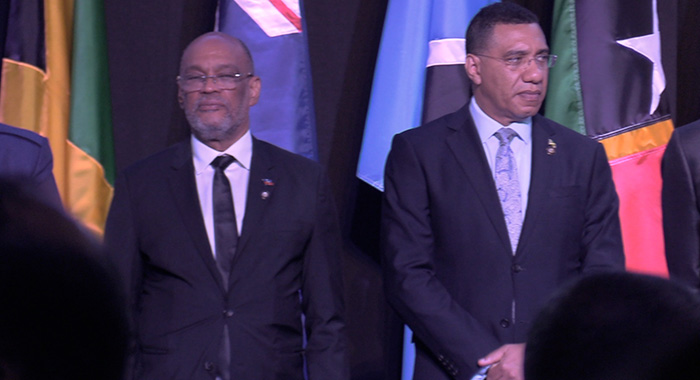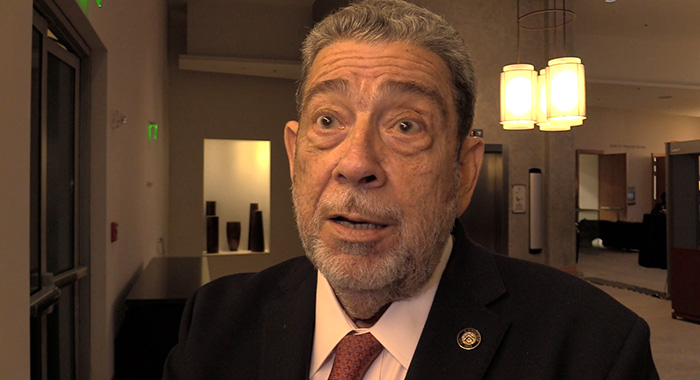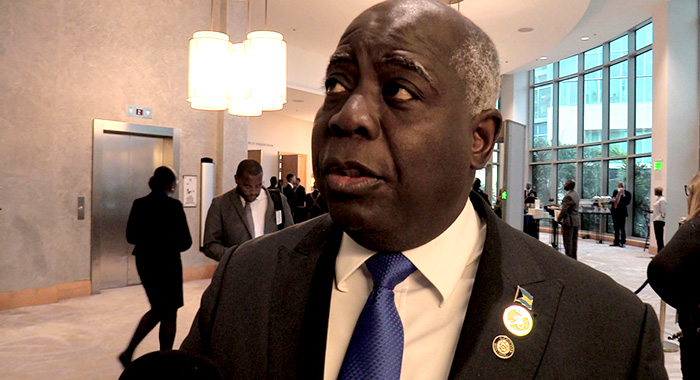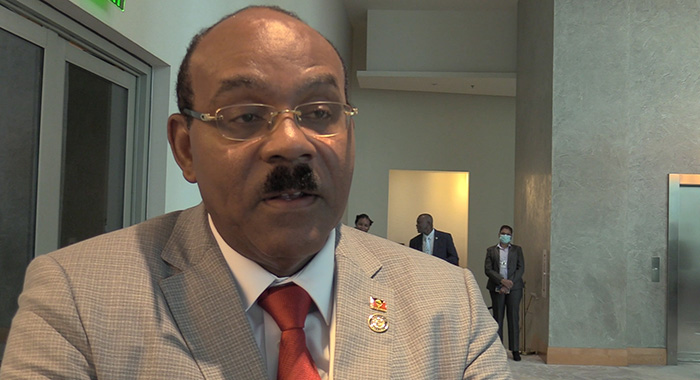By Peter Richards
PORT OF SPAIN, Trinidad (CMC) — Antigua and Barbuda Prime Minister Gaston Browne says while he understands the current situation in Haiti is a “delicate issue”, he nonetheless believes that the Haitian leader, Ariel Henry “can become an honest broker” if he publicly indicates that he has no intention of contesting the next election in the French-speaking CARICOM country.
“I believe that the current prime minister, Ariel Henry, he has a significant role to play. I believe the time has come for him to be magnanimous and to indicate publicly to the Haitian people, he and others in his government will not be contesting the elections whenever they called,” Browne told the Caribbean Media Corporation (CMC).
CARICOM leaders, who are into the third and final day of their 45th annual summit, are discussing the current political and socio-economic situation in the member state with United Nations Secretary General Antonio Guterres reiterating the need for an international security force to help restore peace and stability to the country.
Henry became prime minister following the July 7, 2021 assassination of President Jovenel Moise at his private residence overlooking the capital. But since then, he has had to deal with calls for his resignations from opposition legislators as well as having to deal with criminal gangs that have severely disrupted life in the country with a spate of kidnappings., murders and rival warfare.

Browne told CMC that while Henry has said “privately” he does not intend to contest the elections, he believes nonetheless that “it should be said openly to the Haitian people.
“And I’m of the view that if he only takes that position, then he can become an honest broker and between his efforts utilising the most powerful office in Haiti, as an honest broker, along with the eminent persons group and with the support of the international community; I believe that we could, let’s say, develop a Haitian solution for that matter.
“Haiti could put together a programme to, first of all, stabilise the country to deal with the lawlessness within the society,” Browne said, telling CMC “at the same time, concurrently, establish a framework and certainly some firm dates for elections, and also to consult with the various stakeholders who will be interested in participating in those elections, and to place the country in a state of resident readiness to hold presidential elections.
“So, you know, we’ve always argued that it has to be a homegrown solution. I know that many countries will be gun shy to send in troops, and to you know, and I mean end up in a situation in which a country could be further destabilise, you have seen this happen, I mean, in other countries,
“But if you have a homegrown solution, and one in which, you know, the Haitian people will participate in the stabilisation of the country and ultimately in the selection of a president and to do so, as soon as practicable … take at least another 12 to 18 months, then and I think that is the way to go.
“But the current leader, Ariel Henry, I think he should be at the centre of the let’s say the planning and organisation assuming that you will not be participating in elections,” Browne told CMC.

St. Vincent and the Grenadines Prime Minister Ralph Gonsalves shares Browne’s position, reminding CMC that during the CARICOM summit in the Bahamas earlier this year, Henry had given an undertaking to not be involved in the election.
“Well, since in the Bahamas, Henry has said, point blank in an answer to a question to me. And then I pulled Justin Trudeau, (Prime Minister of Canada) who was there, and said, ‘Hear what the Prime Minister is saying. He said that he’s not running and nobody in his government would be running for the office of prime minister or president or any such office in any elections.’
“He has said that and he said he has said it publicly. I don’t know. But he certainly said it to me, said it repeatedly to me in the presence of Prime Minister Trudeau and also the Prime Minister of the Bahamas when we were in the Bahamas. So that is a matter of record. And I mean, I can say that because he told me that, he told me that in front of witnesses,” Gonsalves told CMC.
But Gonsalves, the longest-serving CARICOM leader, told CMC that he wanted to make it clear that “whatever we do here in CARICOM, or we at the UN … it has to be within the framework, that the process must be Haitian devised and Haitian led”.
Gonsalves said CARICOM is playing a role in the political process, to get all the stakeholders together, including the government so that “we can have an inclusive process for a political solution, leading eventually, maybe to another year and a half, two years’ time, for elections in circumstances where they can be held credibly in a secure environment”.
He insisted that the political goes hand-in-hand with the security and of course, naturally, the humanitarian “and they have to go on similar tracks, and they all feed into one another”.
Gonsalves said that the government came into office, “not as a consequence of any elections but as a consequence of necessity in the country.
“… the government came into being, through the declaration, the word-of-mouth declaration by the former president, who was elected, that he would appoint Henry as as prime minister, and then he was assassinated and then Henry became the prime minister in those circumstances, and accepted by CARICOM, the US, Canada, France, countries in Latin American and the United Nations.
“But once you have a political process going, clearly, you’re going to need to have a reconfiguration of the government, both personnel and in structures, with those structures having particular levels of authority, not a window dressing business, but something real.”
Gonsalves reiterated that how that reconfiguration should take, is the business of the Haitian people.
“So when you asked me point blank whether the government shouldn’t be shunted aside, that’s not for me now or for anybody else outside. But clearly, there are voices within Haiti who are quite critical of the government.
“And in fact, there are voices all about critical of all governments, but the different situation in Haiti is that you have a government not put there by an electoral process — by the consent of the people — and therefore you have to find some other kinds of consultative mechanism, inclusive framework, and to see if you can get a broad enough consensus as the kind of reconfiguration in structures, processes and personnel as you can possibly have to carry forward a Haitian security, humanitarian and political process, which is reasonable in all circumstances.”
Asked if he would support CARICOM sending troops into Haiti, Gonsalves replied: “… any support which is given has to be given in the form of assisting the Haitian police.
“We have had experiences before where troops have gone in and created more problems than they. what the Haitian need is support; the police itself that’s what they need. Now, no country in CARICOM has the capacity to send in a sufficient number to make a difference, but there are some which have indicated that they will send in small numbers.”

And, Bahamas Prime Minister Phillip Davis said his country’s position is clear and that “there needs to be assistance to the Haiti National Police by providing them training resources, assisting in recruiting and training, to be able to secure Haiti; to provide a space for peace, tranquility, to allow persons to move about freely without fear of intimidation or violence.
“And that’s our position and we need to get there. We have been talking too much about it and we need just to act. Fortunately, we were able to get all the place, or most of the players, significant players in one room in Jamaica a couple weeks ago, which was a step in the right direction.
“And I think the eminent persons that we appointed, we will get somewhere and get there soon. But it’s a complex issue, because some of the issues are entrenched in personality and those personalities are entrenched in their views. And the question of giving and taking, we have not reached there yet and what has been achieved is I think the lines have been drawn. And we know what issues to be able to now try to bridge those issues,” Davis said.
He told CMC that suggestions that Henry should step aside given that there is a school of thought that he should not be among those who should really be seen as being central to a solution, is “part of the complex issues we have here.
“Because again, it’s all a matter of trust, and you’ll have all sorts of issues bubbling up. Yes, you will have some that think that way. But at the moment, he is the only connection to any semblance of order.
“And yes, there’s this point of view that efforts we make might only be to shore him up. But it’s not that because I sense a genuineness in him in trying to get a resolution. And I think we are working towards helping that situation,” Prime Minister Davis told CMC.






